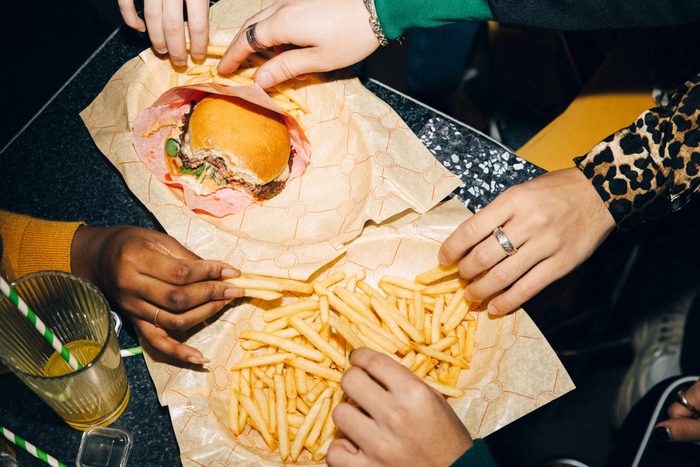
Your gut is a lot more important for your overall health than you probably realize. In fact, research shows that maintaining a health gut microbiome is key to supporting numerous everyday functions of the body, and can decrease your risk of chronic diseases. That’s why it’s important to make sure you’re doing all you can to support your gut microbiome, and avoiding habits that hurt your gut health, which puts your overall health at risk. Along with increased symptoms of depression and anxiety as well as gastrointestinal issues, your body is more prone to getting sick and even developing autoimmune diseases.
The Healthy @Reader’s Digest spoke with Patricia Kolesa MS, RDN about habits that hurt your gut health, as well as the small lifestyle tweaks to make that will benefit your gut microbiome for the long run.
Queen Elizabeth’s 10 Daily Habits That Helped Her Live 96 Years
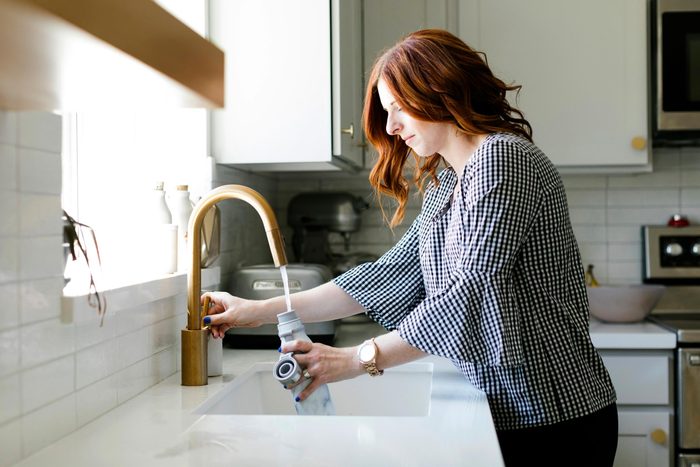
Not drinking enough water
“Water helps deliver the nutrients from your food to different parts of the body and aids in removing waste,” says Kolesa. “The recommended amount for the average person is 64 ounces per day (eight cups). Without adequate hydration, toxins can build up in the body and run the risk of dehydration and/or constipation.”
To increase your water intake throughout the day, Kolesa offers up a few suggestions:
- Use a water bottle with a fluid intake tracker to stay motivated
- Keep your water nearby while you work so you’re reminded to take a sip.
- Add lemon, limes, or cucumbers to give it a new, refreshing flavor
- Brew yourself a cup of hot decaffeinated tea at night
You can also try The 3 Best Hydrating Beverages That Aren’t Water, from a Certified Sports Dietitian
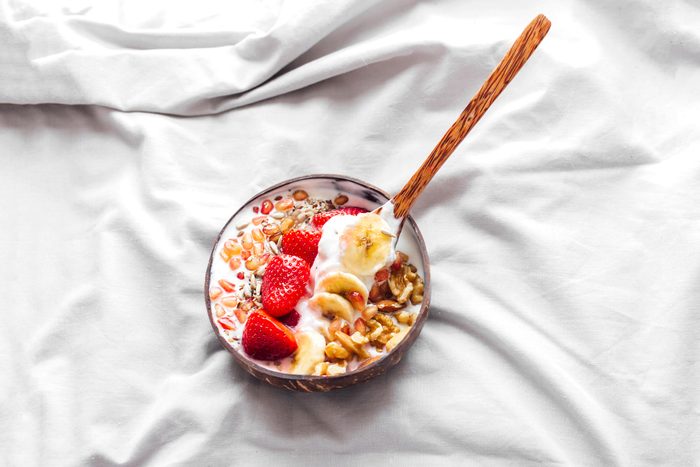
Not consuming enough pre- and probiotics
“Probiotics are the ‘good bacteria’ found in your gut,” says Kolesa. “Probiotics can change intestinal bacteria to balance your gut flora. This boosts your immunity and overall gut health because the probiotics from your food are added to the gut. Prebiotics are non-digestible components to encourage the growth of healthy bacteria in your gut. When taken together, prebiotics and probiotics can improve gut health.”
Kolesa says adding in a balance of prebiotic foods (such as whole grains and a variety of fruits and vegetables) and probiotics (fermented foods and cultured yogurts, for example) is a great place to start. As for taking supplements, Kolesa suggests talking to a registered dietitian before making the investment.
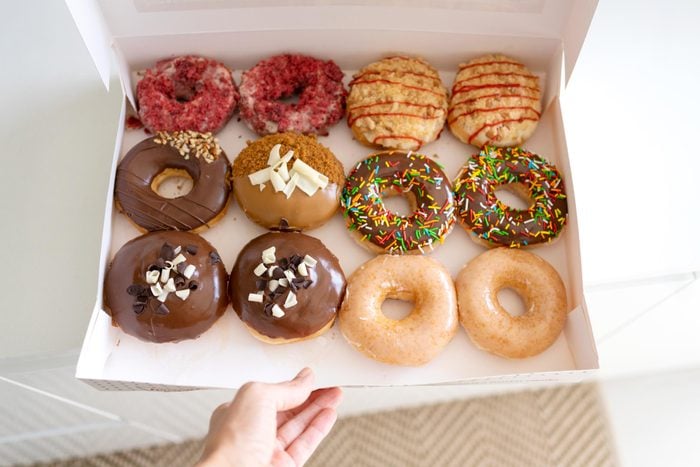
Not eating enough during the day
It may seem convenient to skip a meal during the day, but according to Kolesa, it’s high on the list of habits that hurt your gut health. “When we don’t eat enough or skip meals, we tend to gravitate towards quick foods to fill the void of hunger,” she says. “This might look like fast food, sweet snacks, or energy-dense foods. More often than not, this results in more mindless eating that can turn into a build-up of unhealthy bacteria in the gut. This is due to added stress on the body.”
Kolesa says to aim for eating a balanced meal every three to four hours. Packing a variety of small snacks that include fiber, protein and healthy fats can help you feel full, and keep your gut happy.
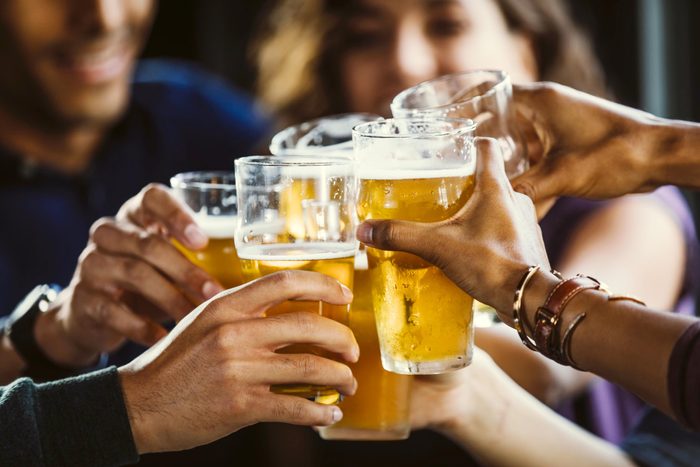
Drinking too much alcohol
Unfortunately, research shows drinking too much alcohol can negatively affect the microbiota in the gastrointestinal tract (GIT). A review in Alcohol Research found that alcohol-induced changes in the GIT alter microbiota composition and contribute to alcohol-induced oxidative stress, which increases the development of alcoholic liver disease as well as other diseases like gastrointestinal cancers. Alcohol causes cell death when consumed, which changes the composition of the intestine and overwhelms the GIT. This results in intestinal and other organ damage, and the potential development of chronic diseases.
Drinking This Much Alcohol a Week Can Negatively Affect Your Brain
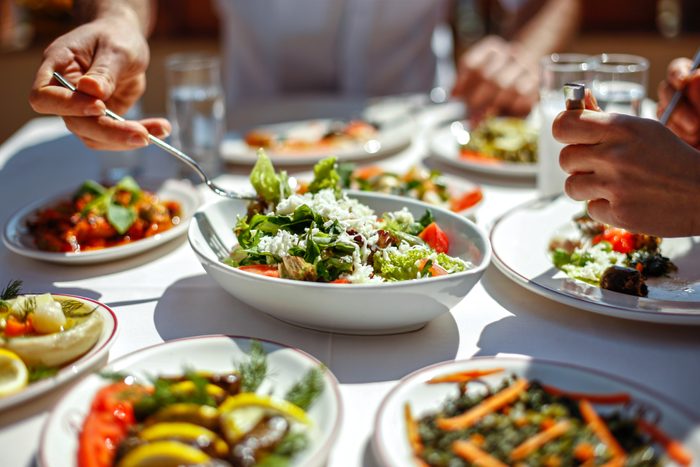
Eating a low-fiber diet
The 2020-2025 Dietary Guidelines recommend consumers get at least 25 to 38 grams of fiber in a day, but only 7% of adults get the fiber intake they need, which research shows can negatively affect the health of the gut microbiome.
“The more healthy bacteria you have in your gut, the better it is for your health,” says Kolesa. “Some emerging studies are showing fiber as a possible contributor to diversity in gut microbiota. The two types of fiber are soluble and insoluble fiber. Soluble fiber attracts water and slows digestion, allowing you to feel fuller for longer. It also helps to feed the good bacteria in the gut. Insoluble fiber adds bulk to the stool and helps food pass better through the stomach and intestines.”
Kolesa suggests finding ways to increase your fiber intake to feed that gut bacteria, like choosing whole grains and adding more high-fiber foods into your meals such as legumes, fruits, and vegetables. However, increasing fiber may not be wise for someone with conditions like IBS, so Kolesa suggests talking with a doctor and registered dietitian in order to determine the amount of fiber that works for your specific body’s needs.
For more wellness updates, follow The Healthy on Facebook, Instagram, and Twitter. Keep reading:

